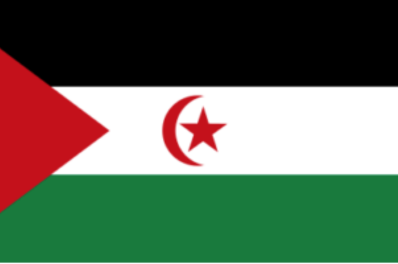World
Western Sahara : Liberty, Democracy, Unity

Western Sahara, a disputed territory in North Africa, has a complex and tumultuous history. The region has been inhabited by various groups of people for thousands of years, including Berber tribes, Arab nomads, and European colonizers. In this article, we will explore the key events and forces that have shaped the history of Western Sahara up to the present day.
Pre-colonial History
The first inhabitants of Western Sahara were likely Berber tribes, who settled in the area as early as 5000 BCE. The region was also an important trade hub, connecting the Mediterranean world with sub-Saharan Africa. Over time, Arab tribes migrated to the area and formed their own societies alongside the Berbers.
In the late 15th century, European explorers began to make contact with the peoples of Western Sahara. In 1505, the Portuguese established a fort on the coast, but they were unable to exert much control over the interior. Over the next few centuries, various European powers, including Spain, France, and Britain, attempted to establish colonies in the region, but were met with resistance from local tribes.
Colonialism
In the late 19th century, European powers began to carve up the African continent in what is known as the “Scramble for Africa.” In 1884, Spain claimed Western Sahara as a colony, known as Spanish Sahara. The Spanish established a series of coastal forts and began to extract resources from the region, including phosphates, which were used in fertilizer and other industrial products.
The Spanish colonial period was marked by conflict and resistance. In 1973, the Polisario Front, a nationalist group seeking independence for Western Sahara, was formed. The Polisario launched a guerrilla war against Spanish forces, which culminated in a ceasefire in 1975.
Moroccan and Mauritanian Claims
After the ceasefire, Spain agreed to hold a referendum on the future of Western Sahara. However, before the referendum could take place, Morocco and Mauritania both claimed sovereignty over the territory. In 1976, the Polisario declared the Sahrawi Arab Democratic Republic (SADR), a government-in-exile based in Algeria.
Morocco and Mauritania both occupied parts of Western Sahara, with Morocco taking control of the majority of the territory. The Polisario continued to fight against Moroccan forces, and a United Nations peacekeeping force was established in the region in 1991. The UN brokered a ceasefire, but a referendum on the status of Western Sahara has yet to take place.
Current Status
Today, Western Sahara remains a disputed territory, with Morocco controlling most of the region and the Polisario controlling some areas in the east. The international community is divided over the issue, with some countries recognizing the SADR as a sovereign state, while others recognize Morocco’s claim.
The conflict has had a devastating impact on the people of Western Sahara, with many forced to flee their homes or live in refugee camps. The region’s natural resources, including phosphates and fisheries, continue to be a source of tension between Morocco and the Polisario.
In recent years, there have been some diplomatic efforts to resolve the conflict, but a lasting solution remains elusive. The history of Western Sahara is a reminder of the ongoing struggle for self-determination and the consequences of colonialism and political instability in the region.
Western Sahara is a disputed territory located in North Africa, between Morocco and Mauritania, and it has been the subject of a long-standing territorial dispute between the Kingdom of Morocco and the Polisario Front, which represents the Sahrawi people’s aspirations for independence. The situation in Western Sahara is complicated by various issues, including economic and political interests, the exploitation of natural resources, and, unfortunately, racism.
The population of Western Sahara is diverse, and it includes Sahrawis, Moroccans, and other ethnic groups such as Black Africans. However, the Sahrawi people, who are indigenous to the region, have experienced discrimination and marginalization in different forms for decades.
One of the most significant forms of racism against the Sahrawi people is the discrimination and persecution they face in the Moroccan-controlled areas of Western Sahara. The Moroccan authorities have systematically targeted Sahrawis, subjecting them to arbitrary arrests, torture, and extrajudicial executions. The Sahrawis are also subjected to discrimination in access to education, employment, and healthcare. They are often excluded from economic and political opportunities, which further exacerbates their marginalization and perpetuates the cycle of poverty.
Moreover, the Sahrawis who are living in refugee camps in neighboring Algeria have also experienced racism and discrimination. The refugees have been living in the camps for over 45 years, and they face significant challenges, including limited access to education, healthcare, and employment opportunities. They are also subjected to environmental hazards, such as extreme weather conditions and sandstorms.
Another manifestation of racism in Western Sahara is the discrimination against Black Africans. Black Africans who are living in Western Sahara, including Sahrawis, face discrimination, racism, and xenophobia. They are often subjected to racial profiling and harassment by the Moroccan authorities, and they are denied access to basic services such as education, healthcare, and employment opportunities. Black Africans in Western Sahara also face violence and exploitation, including forced labor and human trafficking.
In conclusion, racism is a significant problem in Western Sahara. The Sahrawi people, particularly those living in Moroccan-controlled areas, have experienced discrimination and marginalization for decades. The situation is further complicated by the ongoing territorial dispute, which has created political, economic, and social challenges for the region.












You must be logged in to post a comment Login